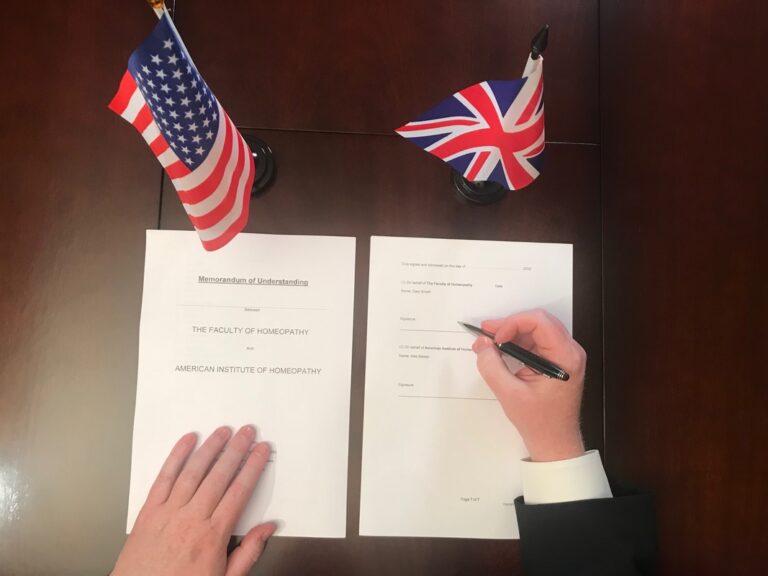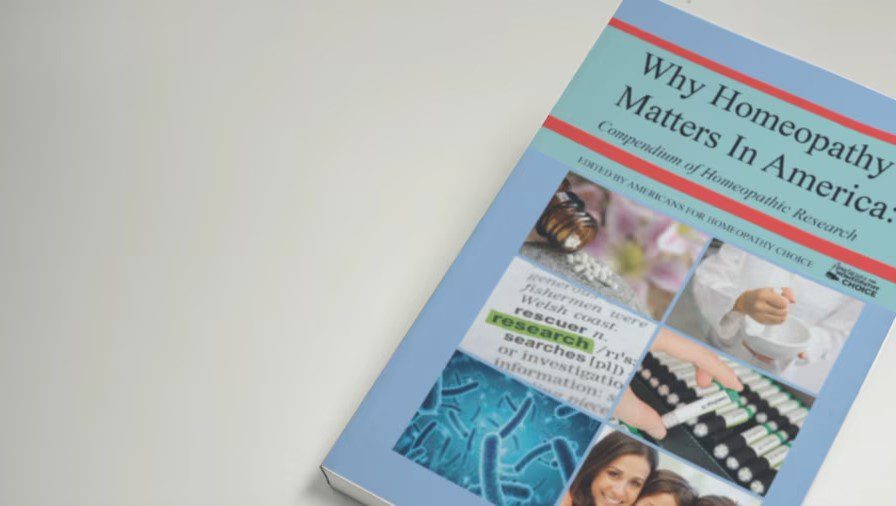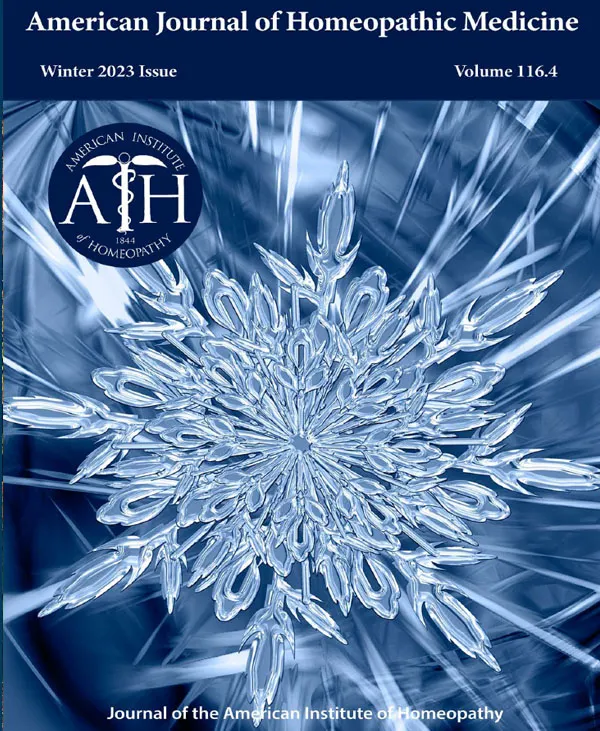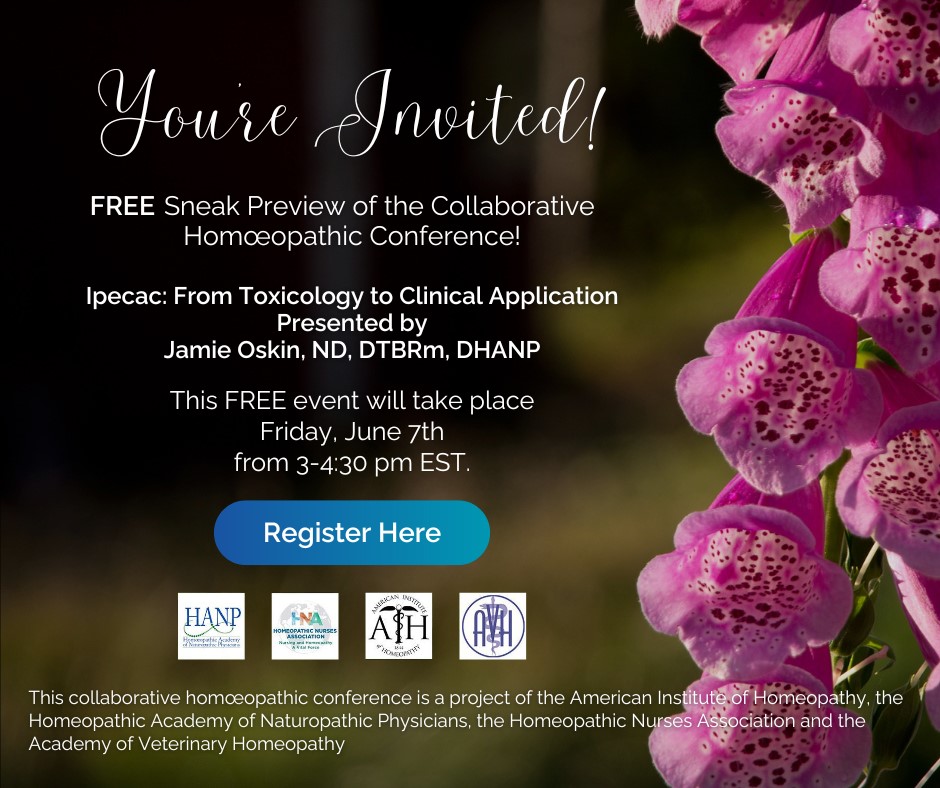
Letter to FTC in Response to Statement on Homeopathy
November 30, 2016
The American Institute of Homeopathy applauds the Federal Trade Commission’s (FTC) goal of protecting the American public from false advertising claims, but in a recent circumstance we believe the FTC has overstepped its jurisdictional bounds and promulgated false information in what appears to be a bid to restrict health care choices available to the American public.
In Response to the recent Enforcement Policy Statement1 and a Consumer Information Blog,2 both issued by the FTC on November 15, 2016, the American Institute of Homeopathy registers our strong concern regarding the content of the following inaccurate statements:
- Homeopathy is based on the view that disease symptoms can be treated by minute doses of substances that produce similar symptoms…
Homeopathy is not based on a view or an opinion. It is based on reliable, reproducible, clinically acquired, empiric evidence gathered through two centuries of corroborated data, assisted by thousands of practitioners worldwide, demonstrating the actions of different medicinal substances in living systems, aka: the science of homeopathy. In fact, the homeopathic scientific community were pioneers of the modern scientific method including the widespread adoption of blinded and placebo controlled studies in 1885, decades before conventional medicine.3
Homeopathy is not based on a theory or on conjecture, but on principles that have been confirmed by long-studied clinical data, meticulously gathered and analyzed over many years.
- Many homeopathic products are diluted to such an extent that they no longer contain detectable levels of the initial substance.
While the dilution and succussion process of formulating homeopathic medicines does reduce the concentration (and the toxicity) of the original substances, detectable amounts of these materials remain quantifiable in the form of nanoparticles dispersed throughout.4 Multiple independent laboratories, worldwide have confirmed that these nanoparticles persist,5 and that they are biologically active.6 Many other homeopathic products (particularly those sold OTC and described as low potency ) have dilute amounts of the original substance that remain chemically detectable by straightforward titration.
- homeopathic product claims are not based on modern scientific methods
This statement is false and misleading. The active ingredients within most OTC homeopathic products have hundreds or thousands of case reports from physicians who have used these medicines. These reports of direct clinical experiences establish a collective, real-world dataset that demonstrates which conditions have been observed to respond to treatment. Such historical data is similar to the types of information used to demonstrate effectiveness for many conventional OTC medicines on the market today.
The Homeopathic Pharmacopeia Convention of the United States (HPCUS) maintains a formulary describing the appropriate manufacturing standards for homeopathic medicines. Every homeopathic manufacturer member of the American Association of Homeopathic Pharmacists in good ethical standing complies with both manufacturing and labeling standards set by the HPCUS. Consumers should be cautious when using any products that are not distinguished by conformance with HPUS on the label.
- the case for efficacy is based solely on traditional homeopathic theories
This statement is false. Neither homeopathy nor homeopathic efficacy is based on any theories. Efficacy for various homeopathic medicines has been established by scientifically reproducible clinical empiric research evidence and cured patient cases followed over many years. Homeopathy is an evidence-based medical subspecialty rooted in patient care.
- there are no valid studies using current scientific methods showing the product’s efficacy.
While this statement may have limited accuracy with respect to some OTC products, it is false and misleading with respect to most homeopathic medicines listed in the Homeopathic Pharmacopeia of the United States. Hundreds of state-of-the-art double-blinded, randomized, placebo-controlled studies, many in peer-reviewed journals, demonstrate the superior efficacy of homeopathic medicines in a wide range of conditions, including asthma,7 depression and anxiety,8 chronic illness,9 allergic rhinitis,10 hypertension,11 headaches/migraines,12 sepsis,13 mild traumatic brain injury,14 otitis media,15 cancer,16 and many other conditions. The American Institute of Homeopathy maintains and continually updates an extensive database, available free to the public, with over 6,000 research articles.17
Multiple meta-analyses published in peer reviewed medical journals that conclude that homeopathic medicine effects are superior to placebo and that additional study of this therapeutic system is warranted.18,19,20,21,22,23 To that end, we encourage the National Institutes of Health to reverse their current position of blocking funding for homeopathic trials.24
- marketing claims that such homeopathic products have a therapeutic effect lack a reasonable basis and are likely misleading
The conclusion of whether a product has a reasonable basis is entirely irrelevant if that product has demonstrable clinical effectiveness. The important question, when it comes to homeopathy, is whether it is effective in clinical settings, not whether it has a reasonable basis for how it works. The mechanism by which homeopathy works differs from conventional medicines, but this fact does not make these products misleading .
Several recent class-action lawsuits brought against homeopathic manufacturers confirm that marketing practices were neither deceptive nor misleading.25
The FTC’s inability to formulate a reasonable basis for why homeopathic medicines work should not enter into any governmental enforcement policy statement. The FTC is not a medical organization, lacks expertise in interpreting scientific research, and is not qualified to make any comment on the validity of any field of medicine. To be less misleading, the FTC should exclude opinions from its policy statements.
- Homeopathy: Not backed by modern science
Homeopathy, as a system of medicine, does not fall under the purview of the FTC. Therefore, the FTC has been reckless in expressing an opinion of this magnitude. In this situation, the FTC’s comments can only be construed as being prejudicially biased and intentionally discriminatory against homeopathy. Such statements cause unwarranted harm to public trust and damage to a respected traditional system of medicine in the United States.
The American Institute of Homeopathy strongly objects to the FTC’s characterization of the entire field of homeopathic medicine as being without scientific evidence of efficacy. These comments are unqualified and wholly lacking in merit. The release of this Enforcement Policy Statement serves only to align the FTC with several recently released scientifically fraudulent reports by a variety of pseudoscientists and lowers the credibility of this valued consumer protection agency.
This type of misinformation should be embarrassing to a government organization striving to be nonpartisan and objective. The FTC owes an apology to the American Institute of Homeopathy as well as the many consumer groups that look toward this agency for fair and accurate information.
References
- FTC: Enforcement Policy Statement on Marketing Claims for OTC Homeopathic Drugs
- https://www.consumer.ftc.gov/blog/homeopathy-not-backed-modern-science
- DJ Meguire,. Report of the Directors of Provings; AW Woodward. A New Standard of Criticism for Drug Provings. Transactions of the Thirty-Eight Session of the American Institute of Homeopathy. pp.147-154. St. Louis, 1885.
- Chikramane PS, Suresh AK, Bellare JR, and Kane SG. Extreme homeopathic dilutions retain starting materials: A nanoparticulate perspective. Homeopathy 2010;99:231-242.
- Upadhyay RP, Nayak C: Homeopathy emerging as nanomedicine. International Journal of High Dilution Research 2011, 10(37):299 310.
- Bell IR, Schwartz GE, Boyer NN, et al., Advances in integrative nanomedicine for improving infectious disease treatment in public health. Euro J Intregr Med 2012; 5(2): 126-140.
- Reilly D, Taylor MA, Beattie NGM, et al, Is Evidence of Homeopathy Reproducible? , Lancet 1994;344:1601-1606.
- Davidson JRT, Morrison RM, Shore J, et al. Homeopathic Treatment of Depression and Anxiety. Alternative Therapies, 3, 1, January 1997, 46-49.
- Witt CM, Ludtke R, Mengler N, et al. How Healthy are Chronically Ill Patients After Eight Years of Homeopathic Treatment? -Results from a Long Term Observational Study. BMC Public Health20088:413 DOI: 10.1186/1471-2458-8-413
- Colin P. Homeopathy and respiratory allergies: a series of 147 cases. Homeopathy. 2006 Apr;95 (2):68-72.
- Campistranous- Lavout JL., et al. Hypertension Trial. Boletin Mexicano, 1999, 32, 42- 47.
- Brigo B, Serpelloni G, Homoeopathic Treatment of Migraine. Berlin Journal on Research in Homoeopathy, 1, 2, March, 1991, 98-106.
- Frass M, Linkesch M, Banyai S, et al. Adjunctive homeopathic treatment in patients with severe sepsis: a randomized, double-blind, placebo-controlled trial in an intensive care unit.Homeopathy. 2005 Apr; 94, 2, 75-80.
- Chapman EH, Weintraub RJ, Milburn MA, et al. Homoeopathic Treatment of Mild Traumatic Brain Injury.Journal of Head Trauma and Rehabilitation, 14, 6, December 1999, 521-42.
- Frei H, Thurneysen A. Homeopathy in Acute Otitis Media in Children: Treatment Effect or Spontaneous Resolution? British Homeopathic Journal, 2001, Oct, 90, 4, 180-2.
- Frenkel M, Mishra BM, Sen S, et al. Cytotoxic effects of ultra-diluted remedies on breast cancer cells. Int J Onc 2010; 36:395-403.
- http://homeopathyusa.org/guide-to-research.html
- Kleijnen J, Knipschild P, Ter Riet G, Clinical trials of homeopathy. Br Med J 1991;302(6772):316-23.
- Linde K, et al. Critical Review and Meta-Analysis of Serial Agitated dilutions in Experimental Toxicology. Human and Experimental Toxicology. 1994;13:481-492.
- Boissel JP, Cucherat M, Haugh M, Gauthier E. Critical literature review on the effectiveness of homeopathy: overview of data from homoeopathicmedicine trials. Homoeopathic Medicine Research Group. Report to the European Commission. Brussels 1996, 195-210.
- Linde K, Clausius N, Ramirez G, et al, Are the clinical effects of homeopathy placebo effects? A meta-analysis of placebo controlled trials. Lancet 1997;350:834-43.
- Dean ME. (2004) The Trials of Homeopathy. Essen, Germany: KVC Verlag.
- Witt CM, Bluth M, Albrecht H, et al. The in vitro evidence for an effect of high homeopathic potencies a systematic review of the literature. Complement Ther Med, 2007; 15: 128-138
- Williamson, John. Chief, Basic and Mechanistic Research in Complementary and Integrative Health at the National Institutes of Health (NIH), Panel Discussion, Homeopathic Medicine & Advertising Workshop, Federal Trade Commission, November 15, 2015.
- http://www.lexology.com/library/detail.aspx?g=7d9b009a-e041-422c-b9cc-bb0437958523
Latest News & Updates
Latest Issue of the AJHM
AJHM – Winter 2023
Volume 116 Number 4
Table of Contents
- Editorial: In this Issue
- Homeopathic PuZZle?
- A Case of Erectile Dysfunction and Anejaculation in a Diabetic Patient
- Iron and Its Salts: Materia Medica and Illustration
- Suppression in the Organon
- An Appreciation of Jacques Jouanny’s Life and a Review of His Opus “The Essentials of Homeopathic Therapeutics”





